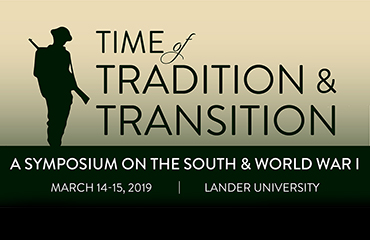 On Thursday, March 14, and Friday, March 15, Lander University will host a two-day symposium on the far-reaching effects that World War I had on the American South.
On Thursday, March 14, and Friday, March 15, Lander University will host a two-day symposium on the far-reaching effects that World War I had on the American South.
The public is invited to the event, made possible by a grant from South Carolina Humanities.
A new book, "The American South and the Great War, 1914-1924," published by LSU Press and co-edited by Lander Associate Professor of History Dr. Ryan Floyd, was instrumental in the obtainment of the grant. Floyd will participate in several panel discussions during the symposium, as will his co-editor, Dr. Matthew Downs, associate professor of history at the University of Mobile, Alabama.
Floyd said that he got the idea for the book while researching his earlier book, "Abandoning American Neutrality: Woodrow Wilson and the Beginning of the Great War, August 1914-December 1915."
"I was surprised to discover that there were no books on the American South in World War I. There were articles here and there, or a chapter here and there," but no books, he said.
Floyd called the lack of published material on the topic "a real mistake." World War I "had a significant effect on the South" in a variety of ways, he said.
Not only Downs, but several of the authors who contributed essays to the new book will also take part in the symposium. They include Dr. Angela Jill Cooley, associate professor of history at Minnesota State University, Mankato; Dr. Keith Gorman, assistant dean for Special Collections and University Archives at the University of North Carolina-Greensboro; Dr. Fritz Hamer, curator and archivist of the South Carolina Confederate Relic Room & Military Museum; former University of South Carolina faculty member and historian Dr. Janet Hudson; and Ms. Kathelene McCarty Smith, instruction and outreach archivist at UNC-Greensboro. Other speakers include Claflin University Assistant Professor of History Dr. Kathryn M. Silva and Furman University Assistant Professor of History Dr. Courtney Tollison.
The symposium will feature panel discussions on World War I's impact on women and patriotism; the U.S. military and foreign policy; Southern agriculture and economy; and race relations in the South. In another session, undergraduate students from Lander and Presbyterian College will present selected papers that they wrote on Greenwood and South Carolina.
The symposium will also include two evening plenary sessions: "Local Stories: World War I, Greenwood, and the S.C. Upstate," on Thursday at 6 p.m., and "Stories from Across the South: How World War I Affects Our Region," on Friday at 6 p.m. The first will feature former Greenwood Mayor Welborn Adams; veteran and American Legion Post 20 member Dale Kittles; and Trey Ward, president of John Ward Painting. Adams, Kittles and Ward will discuss the controversy surrounding Greenwood's old World War I memorial, which lists veterans by race. They will be joined by the Rev. Christopher Thomas, director of the GLEAMNS Dr. Benjamin E. Mays Historical Preservation Site. The Friday evening session, meanwhile, will offer an overview from the participating scholars on the broad impacts of World War I on the region.
Floyd credited Dr. Lucas McMillan, dean of Lander's College of Behavioral & Social Sciences, with putting the symposium together, and predicted that it would be exciting.
"It's going to be a very comprehensive kind of discussion. These are very knowledgeable folks who are coming," he said.
The events are free, and members of the public interested in attending the symposium can register by going to www.lander.edu/ww1. While not required, registration is recommended.
By clicking on the "Explore This Section" heading, participants can also view travel information, a complete schedule of events, and additional information about featured speakers.
S.C. Humanities
The symposium is made possible through the generous support of S.C. Humanities. The mission of South Carolina Humanities is to enrich the cultural and intellectual lives of all South Carolinians. This not-for-profit organization presents and/or supports literary initiatives, lectures, exhibits, festivals, publications, oral history projects, videos and humanities-based experiences that reach more than 250,000 citizens annually. South Carolina Humanities receives funding from the National Endowment for the Humanities as well as corporate, foundation and individual donors. It is governed by a volunteer Board of Directors comprised of community leaders from throughout the state.